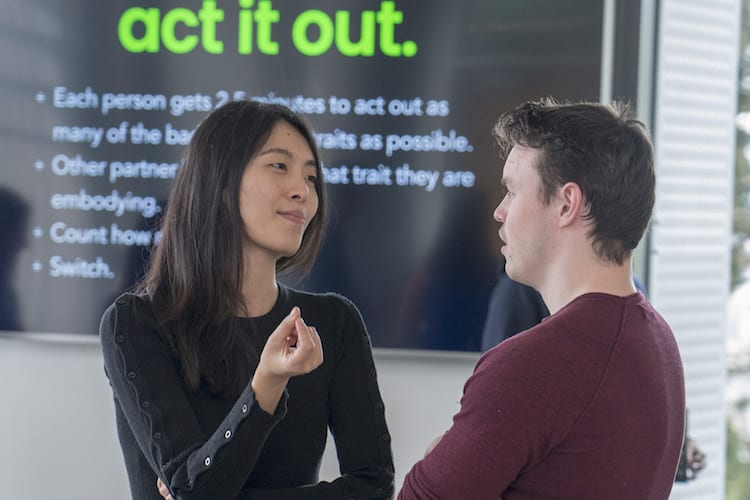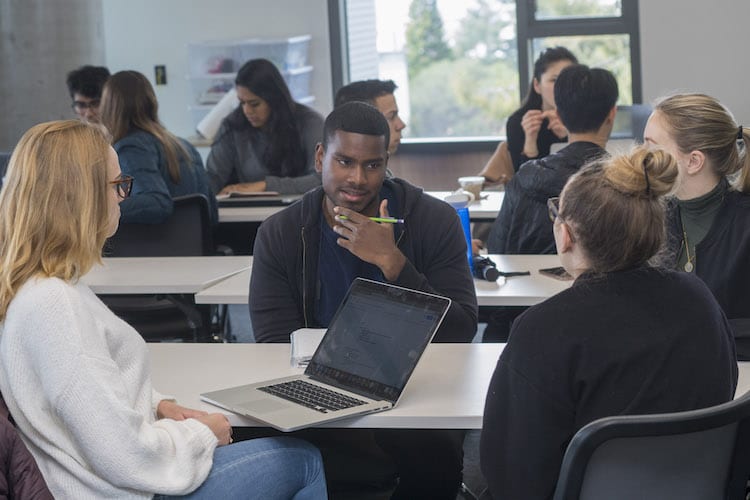“Classified” is a series spotlighting some of the more powerful lessons faculty are teaching in Haas classrooms.

Nearly 40 students poured out of the Chou Hall elevators on a recent morning on a strange mission: to find ways to get rejected in less than 15 minutes.
One student told a passerby it was her birthday. “Could you sing ‘Happy Birthday’ to me?” she asked. Another offered to swap his jacket for a person’s laptop. Yet another went from table to table at Café Think, asking for bites of food.
The exercise may sound like improv, but it’s just part of Haas Lecturer Alex Budak’s new undergraduate course called Becoming a Changemaker. The course aims to inspire and empower future leaders with the mindset and tools to make a positive impact on the world—a mission that includes learning to overcome fear of failure by confronting it head-on.
“If you seek to do anything innovative or meaningful in your life, you’re inevitably going to fail along the way,” Budak said. “It’s one thing to intellectualize failure, but it’s another to feel it personally. How often do we hold back asking for something because we’re sure we’ll fail when in reality we may not? We’re failing even before we try.”
Turning panic into confidence
The rejection exercise is just one example of how Becoming a Changemaker tries to upend traditional notions of leadership. In follow-up interviews, students described how a near sense of panic turned to newfound confidence as they practiced asking for something and not getting it.
“It was one of the most powerful educational experiences I’ve ever had,” said Nye Avilla, BS 20, who overcame her fear of asking people if she could borrow their umbrellas. Despite getting rebuffed time and again, she basically realized it was no big deal to ask. “By being more open to failure, I know now that I can be a better leader and a better individual.”

The students were also struck by how many strangers agreed to their outlandish requests, because it reminded them that people do want to help and that their own reticence can be inhibiting.
“Outdated notions of leadership tell young people to wait their turn; to wait for permission to lead,” Budak said. “But while leaders might be scarce, leadership is abundant. We can all lead positive change from wherever we are, whether we’re an intern or a CEO. Leadership is not a title; it’s an act. This course reflects the Haas commitment to building a different kind of leader.”
That’s why the Haas Defining Leadership Principles—Question the Status Quo, Confidence Without Attitude, Student Always, and Beyond Yourself—are woven throughout the course curriculum, he said.
The sum of “small, daily acts”
Students say the course has fundamentally changed how they think about leadership and has transformed how they see themselves in the world.
Sarika Saksena, for example, was 14 years old when she launched a nonprofit, Ujala, that has taught more than 1,000 women in India how to make and sell candles to gain financial independence. Despite her success and experience, the self-described introvert says she never thought she had what it takes to succeed as a leader.
“Before this class, I believed, like many others, that successful leaders are always extroverts, outspoken, bold, and dominating,” said Saksena, a freshman who plans to apply to Haas. She said Budak has taught her that leadership instead requires, among other things, humility, trust in yourself and others, a collaborative team spirit, and the resilience to “fail forward” after taking calculated risks. She sees leadership now as the sum of these small, daily acts that are within anyone’s reach.
Adeel Cheema, a senior computer science major who will work as a software engineer at Facebook after he graduates in May, said he didn’t know what leadership in a culture meant before taking the course. “Now I know how to lead culture,” he says.
Budak gives students many opportunities to put what they learn into practice. Throughout weekly two-hour sessions, students break into groups to discuss the topic at hand—including, for example, the role of corporate cultures on change—and their own experiences with it.
Budak’s teaching approach is to help all students recognize their capabilities as changemakers, which involves many techniques. When students arrive in class, they’re greeted with classic songs about change by the likes of Tracy Chapman, Bob Dylan, and Sam Cooke, and written quotes from some of history’s greatest changemakers. His “Changemaker of the Week” exercise gets students to select a favorite change agent and present on how course frameworks and theories apply to their impact. For their final projects, students will work in small teams to identify a positive change they want to make on campus, in the community, or even globally, and develop a strategy for achieving it.
“A dream come true”
Budak says his commitment to fostering changemakers is deeply personal. In 2010, he co-founded the social enterprise StartSomeGood, which has helped over 1,000 people in 50 countries raise over $10 million to launch and scale new social ventures. He joined Haas in 2016, first as the founding executive director of the former UC Berkeley Center for Reinventing Leadership, and then as the director of the Berkeley Haas Global Access Program. Becoming a Changemaker is Budak’s first foray into teaching and, he says, a decade-long dream come true.

“In a world where the only constant is change, our companies, our communities, and our world are yearning for changemakers who can not just survive change but can leverage it to improve lives. These students give me so much hope for the future.” he said.
Ibrahim Balde, BS 20, said the course has opened his eyes to the leader he wants to be and has helped him gain confidence. Balde, who is active in student organizations such as Faces of African Muslims and Black Collectivism for California Students, came to Haas with visions of one day helping disadvantaged groups find economic empowerment.
Balde said the class, with its focus on putting lessons into practice, has been a welcome balance to courses in microeconomics and other technical business subjects.
“This class allows me to think about my mission and purpose and to understand that leadership isn’t a defined trait,” Balde said. “It’s a series of actions, a conscious effort every day to do the right thing.”